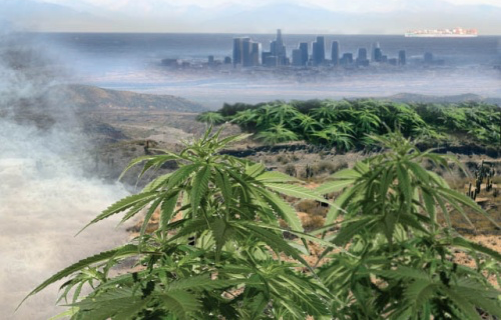Comments420 FILE-Although the Los Angeles City Council adopted three ordinances to regulate and zone cannabis businesses in Los Angeles, it’s hard to imagine the impact of legal pot becoming significant enough to shrink the black market.
Existing medical marijuana dispensaries that are Proposition D-compliant will get first priority in licensing under Proposition M.
Prop. D provides limited immunity to medical marijuana businesses that meet specified requirements by maintaining dispensary locations in Los Angeles to the number open before 2007 and raising taxes to $60 per $1,000 of gross receipts. Prop. M enacted the city council’s ordinance to regulate and tax marijuana in light of Prop. 64, which legalized recreational marijuana statewide after it was approved in November 2016.
Yet, after a cursory look at where legal cannabis marketplaces can be located across the county, it becomes immediately clear that there will be expansive retail pot deserts since other cities in Los Angeles County continue to be more restrictive of legal cannabis.
The retail cannabis locations allowed in Los Angeles under the new ordinances include:
- Commercial Manufacturing in the Glencoe/Maxella Zone: a three-by-two-block area in the Venice, Del Rey, Palms communities; it is an area that’s set to be filled with mixed use residential housing rather than commercial manufacturing.
- Central City West Specific Plan Zone in the northwest part of downtown Los Angeles amidst mixed-use residential neighborhood; or
- Warner Center Specific Plan Zone in Woodland Hills, or
- Los Angeles Sports and Entertainment District Specific Plan Zone: which include the Staples Center bordered by Olympic and Pico Boulevards and Cherry St and Figueroa, or
- Playa Vista Specific Plan Zone: an area bordered by Jefferson and the Ballona Creek Channel; or
- Paramount Pictures Specific Plan Zone: A campus revamp surrounding the last Hollywood studio.
This includes the Lemon Grove, South Bronson, Windsor, Camerford, Waring, and Gregory lots under the Paramount Pictures Specific Plan; or
- USC Specific Plan Zone: USC Specific Plan Zone within Subarea 3 under the USC Specific Plan; or
- Jordan Downs Urban Village Specific Plan Zone: Commercial Manufacturing Zone under the Jordan Downs Urban Village Specific Plan; or
- Cornfield-Arroyo Seco Specific Plan Zone, an area east of Griffith Park and the Los Angeles River.
Aside from these designations, a retail shop can be located outside a 700-foot radius of schools, public parks, public libraries, alcoholism or drug abuse treatment facilities, daycare centers and permanent supportive housing. Retail shops must also be outside a 700-foot radius of any other retailer or microbusiness commercial cannabis activity with on-site retail sales, which is licensed by the state of California and licensed by the city to engage in the commercial cannabis activity defined in this section.
These 10 planned zones form a green belt across the northern part of the city, with the exception of Jordan Downs Urban Village Plan, which is one of the southernmost locations where retail pot dispensaries will be able to open.
All license applicants in Los Angeles now need to pay attention to “Undue Concentration,” which means that the premises of a cannabis business must be situated according to a specified ratio of license to population based on U.S. data and updated by each decennial census.
For retailers, that ratio would be one license per 10,000 residents; for micro businesses, one license per 7,500; for manufacturers, one license per 7,500 residents; and for cultivation the ratio is 1 square foot of cultivated area for every 350 square feet of land zoned M1, M2, M3, MR1.
Existing medical marijuana dispensaries won’t be subject to the Undue Concentration analysis. A micro-business involved in on site retail counts towards the Undue Concentration License and limits applicants to retailer licenses, and a micro-business involved in cultivation counts towards the undue concentration limits applied to the cultivation licenses types.
Businesses in a geographical area of Undue Concentration have to file with the city clerk, on a form provided by the Department of Cannabis Regulation, a request that the city council find that approval of the license application would serve public convenience or necessity, supported by evidence in the record. If the city council does not act on a request within 90 days, it will be deemed to support public convenience.
According to the city controller’s office, there were 191 marijuana businesses that were eligible to apply for a special 2017 Business Tax Registration Certificate and 756 marijuana businesses that held a business tax registration certificate in 2016. The city attorney’s office had filed 563 criminal cases against marijuana businesses.
(Terelle Jerricks is the Managing Editor of Random Lengths News where this piece was first posted.) Prepped for CityWatch by Linda Abrams.
-cw

















